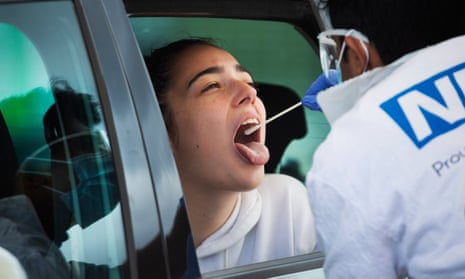The NHS test-and-trace system risks failing to contain future outbreaks unless those told to self-isolate are given urgent financial aid, the government is being warned by its own MPs and advisers.
Boris Johnson is being urged to follow other countries in providing new funding to ensure those asked to self-isolate do not have to choose between supporting themselves and public health.
Several figures who have been advising the government on the behavioural impacts of its coronavirus strategy told the Observer that they wanted to see a major financial package put in place. Senior Tories also voiced concerns. Jeremy Hunt, the former health secretary and chair of the health and social care select committee, said he was “very sympathetic to financial support to boost compliance as that has been important in Taiwan and Korea”.
The warnings come as the prime minister faces pressure to reopen the economy at a faster pace. Last week’s GDP figures showed the UK’s economy had shrunk by a record 20.4% in April.
However, Johnson’s scientific advisers have repeatedly warned that doing so requires a test-and-trace system that is proven to work. There are concerns that the new system could fail if those contacted feel unable to self-isolate. Several figures who have advised the government through the Scientific Pandemic Influenza Group on Behaviours (SPI-B), who said they spoke in a personal capacity, called for a financial package.
Professor Chris Bonell, from the London School of Hygiene and Tropical Medicine and a member of SPI-B, said: “There is a concern that individuals will not adhere to self isolation if there are financial or other material barriers to this. So individuals need to be properly compensated for lost income, and statutory sick pay will, in many cases, not be sufficient. Self-isolation is critical to preventing a second pandemic wave and so investment in this is likely to be very cost effective.”

John Drury, professor of social psychology at the University of Sussex, said: “Outside the pandemic we know that presenteeism is a real problem and one reason for that is that people feel they can’t afford to not come in to work. So yes, I do think there needs to be financial support for people, so that they or their family do not lose out by having to self-isolate. [It] should probably be linked to their normal earnings.” He added that other issues, such as entertainment, loneliness and access to supplies, may also need to be addressed.
Robert West, professor of health psychology at UCL, said it “cannot be right that people take a substantial financial hit for protecting the community”. Gavin Morgan, also from UCL, said any financial package should reflect “their current income levels”. St Andrews psychology professor Stephen Reicher said the system was “completely dependent on compliance” and called for compensation at least part-funded by the private sector.
Senior Tory MPs also have concerns. Robert Halfon, chair of the education select committee, said: “We absolutely have to make it clear that anyone who is self-isolating is going to be able to afford to do so. If you’re a courier and you’re paid for how many boxes you deliver, how are you going to live?” Caroline Nokes, the former cabinet minister, said: “Many will not be able to afford to stay off work… for example, it will be incredibly hard to convince [Uber drivers] they must stay at home when the choice is between doing so and feeding their family.” Former children’s minister Tim Loughton said: “There is definitely an issue around financial impact, particularly on those who cannot work from home.”
Torsten Bell, chief executive of the Resolution Foundation, called for those self-isolating to be eligible for the job retention scheme, under which workers can be furloughed on 80% of their wages. “For an effective test-and-trace system to operate we need people’s family finances to be protected if they are affected,” he said. Gillian Guy, chief executive of Citizens Advice, said: “The government has taken bold steps to help many workers throughout the coronavirus crisis, but it needs to look again at how it can support people to do the right thing.”
A Treasury spokesperson said: “Our furlough scheme has protected nearly nine million jobs. It’s been extended until October – meaning it will have been open for eight months and those self-isolating can continue to access the scheme. We’re continuing to work hard to ensure those self-isolating get the support they need, including making statutory sick pay payable from day one, and we’ve injected more than £6.5bn into the welfare safety net.”
